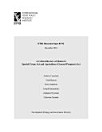Micronutrient policy process in Malawi
Babu, Suresh Chandra · Haggblade, Steven · Mkandawire, Elizabeth · Nankhuni, Flora · Hendriks, Sheryl L.
नव॰ 2016 · IFPRI Discussion Paper · Intl Food Policy Res Inst
ई-बुक
120
पेज
family_home
योग्य
info
reportरेटिंग और समीक्षाओं की पुष्टि नहीं हुई है ज़्यादा जानें
इस ई-बुक के बारे में जानकारी
Micronutrient deficiencies are common across the developing world and have major effects on the health outcomes of its population. Although this is well understood, many countries find it difficult to bring about policy change in this regard. This paper uses micronutrient policies designed and implemented in Malawi as a case study to shed light on the barriers and gaps faced by developing countries for similar programs and policies. To understand the drivers of policy change, this paper uses the kaleidoscope model to trace the policy processes of three major micronutrients—iodine, vitamin A, and iron. Using a select set of policy process tools, as well as field interviews with key informants who were part of Malawi’s micronutrient policy process, the authors test a set of hypotheses on 16 variables that drive policy change in the micronutrient policy sphere. Results indicate that much of the agenda setting for micronutrient policies and programs was triggered by external events that focused on the elimination of micronutrient deficiencies as part of the global development agenda. These events include the International Conference on Nutrition, the Millennium Development Goals, and, more recently, Scaling up Nutrition. The design of micronutrient policies and program interventions in Malawi was adopted by locally mandated ministries and institutions, in collaboration with development partners who provided both financial and technical support at the design stage. The adoption of micronutrient policies and intervention programs was driven primarily by external funding, particularly through supplementation programs related to vitamin A and iron. Adoption of fortification standards for vitamin A has been going on for more than a decade due to continuous resistance from the private sector, which faces additional costs and needs greater technical expertise. The biofortification method of micronutrient interventions for iron and vitamin A is externally driven and relatively new in Malawi. Although this method is widely accepted by policy makers, no concrete strategy has been developed for its design, adoption, and implementation. Further, supplementation and fortification programs continue to face implementation challenges due to poor physical infrastructure and monitoring systems. However, the national institutional architecture required for agenda setting, design, adoption, implementation, evaluation, and review to address micronutrient deficiencies is in place in Malawi. The system needs continued support from development partners for effective functioning at all levels. The use of various tools for the policy change part of the kaleidoscope model indicate that policy change is a dynamic process; over time, changes in the nature and composition of the members of policy and institutional architecture can result in different policy outcomes. The Malawi case study demonstrates two things. First, local leadership is crucial in keeping micronutrient deficiencies on the policy-making agenda, and second, it matters where coordinating power is placed in the policy hierarchy. This paper finds that, even with policy champions, adopted policies will face implementation challenges unless they are supported with adequate resources and are systematically followed through to final execution and delivery.
इस ई-बुक को रेटिंग दें
हमें अपनी राय बताएं.
पठन जानकारी
स्मार्टफ़ोन और टैबलेट
Android और iPad/iPhone के लिए Google Play किताबें ऐप्लिकेशन इंस्टॉल करें. यह आपके खाते के साथ अपने आप सिंक हो जाता है और आपको कहीं भी ऑनलाइन या ऑफ़लाइन पढ़ने की सुविधा देता है.
लैपटॉप और कंप्यूटर
आप अपने कंप्यूटर के वेब ब्राउज़र का उपयोग करके Google Play पर खरीदी गई ऑडियो किताबें सुन सकते हैं.
eReaders और अन्य डिवाइस
Kobo ई-रीडर जैसी ई-इंक डिवाइसों पर कुछ पढ़ने के लिए, आपको फ़ाइल डाउनलोड करके उसे अपने डिवाइस पर ट्रांसफ़र करना होगा. ई-रीडर पर काम करने वाली फ़ाइलों को ई-रीडर पर ट्रांसफ़र करने के लिए, सहायता केंद्र के निर्देशों का पालन करें.







